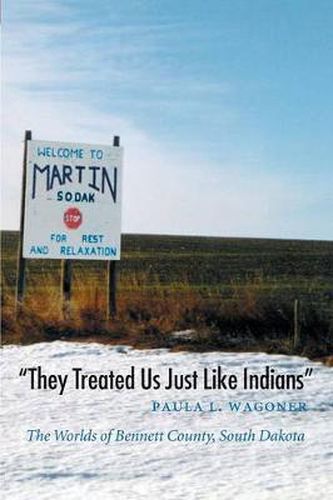Readings Newsletter
Become a Readings Member to make your shopping experience even easier.
Sign in or sign up for free!
You’re not far away from qualifying for FREE standard shipping within Australia
You’ve qualified for FREE standard shipping within Australia
The cart is loading…






On a typical day in Bennett County, South Dakota, farmers and ranchers are busy in their fields and tend animals, merchants order inventory and stock shelves, teachers plan and teach classes, health workers aid the infirm in the county hospital or clinic, and elderly women make quilts and heirlooms for their families or the county fair. Life is usually unhurried in Bennett County, with time for chatting with neighbors and catching up on gossip. But Bennett County is far from typical. Nearly a century ago, the county was carved out of Pine Ridge Reservation and opened to white settlers. Today, Bennett County sits awkwardly between the Pine Ridge and Rosebud Sioux reservations, with nearly one-third of its land classified as Indian Country and the rest considered by many Pine Ridge Lakotas to still belong to the reservation. The county is home to a dynamic population, divided by the residents into three groups–white, fullblood, and mixedblood. Tensions between the three groups are troubled, dark waters surging beneath the quiet harmony of Bennett County’s everyday rural life.In a moving account, anthropologist Paula Wagoner tells the story of Bennett County, using snapshots of community events and crises, past and present, to reveal the complexity of race relations and identities there. A homecoming weekend at Bennett County High School becomes a flashpoint for controversy due to the differences of meaning ascribed by the county’s three identity groups to the school’s Native American mascot. At another time, the shooting of a Lakota man by a non-Indian neighbor and the volatile wake that follows demonstrates the impulse to racialize disputes that lies just beneath the surface of everyday life in Bennett County. Yet, such very real problems of identity have not completely overwhelmed Bennett County. Wagoner also shows that despite their differences, residents have managed to find common ground as a region of diverse insiders who share an economic dependency on federal funds, distrust outsiders, and, above all, who deeply love their land. Paula L. Wagoner is an assistant professor of anthropology at Juniata College.
$9.00 standard shipping within Australia
FREE standard shipping within Australia for orders over $100.00
Express & International shipping calculated at checkout
On a typical day in Bennett County, South Dakota, farmers and ranchers are busy in their fields and tend animals, merchants order inventory and stock shelves, teachers plan and teach classes, health workers aid the infirm in the county hospital or clinic, and elderly women make quilts and heirlooms for their families or the county fair. Life is usually unhurried in Bennett County, with time for chatting with neighbors and catching up on gossip. But Bennett County is far from typical. Nearly a century ago, the county was carved out of Pine Ridge Reservation and opened to white settlers. Today, Bennett County sits awkwardly between the Pine Ridge and Rosebud Sioux reservations, with nearly one-third of its land classified as Indian Country and the rest considered by many Pine Ridge Lakotas to still belong to the reservation. The county is home to a dynamic population, divided by the residents into three groups–white, fullblood, and mixedblood. Tensions between the three groups are troubled, dark waters surging beneath the quiet harmony of Bennett County’s everyday rural life.In a moving account, anthropologist Paula Wagoner tells the story of Bennett County, using snapshots of community events and crises, past and present, to reveal the complexity of race relations and identities there. A homecoming weekend at Bennett County High School becomes a flashpoint for controversy due to the differences of meaning ascribed by the county’s three identity groups to the school’s Native American mascot. At another time, the shooting of a Lakota man by a non-Indian neighbor and the volatile wake that follows demonstrates the impulse to racialize disputes that lies just beneath the surface of everyday life in Bennett County. Yet, such very real problems of identity have not completely overwhelmed Bennett County. Wagoner also shows that despite their differences, residents have managed to find common ground as a region of diverse insiders who share an economic dependency on federal funds, distrust outsiders, and, above all, who deeply love their land. Paula L. Wagoner is an assistant professor of anthropology at Juniata College.